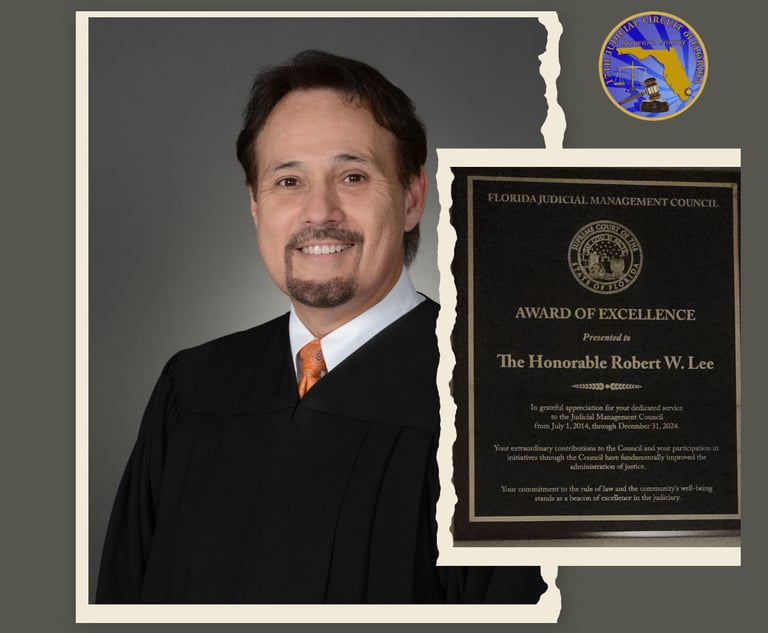 Fake probate Letter of Administration from the Supreme Court of Florida. Courtesy photo.
Fake probate Letter of Administration from the Supreme Court of Florida. Courtesy photo.Court Letterhead Used for Scams Targeting Attorneys, Others
The Florida Supreme Court warned on Wednesday that it doesn't send legal notices via email after a scam has resurfaced, featuring counterfeit letterheads aimed at bilking its targets. Similar frauds have also emerged in Georgia.
February 13, 2019 at 11:31 AM
2 minute read
The Florida Supreme Court on Wednesday warned of an email scam designed to fleece recipients into believing they're part of a case involving an inheritance.
It's the newest incarnation of what court officials say is an epidemic, affecting at least two states— Florida and Georgia — and sometimes targeting attorneys.
This time, Florida officials discovered the scam when a target got in touch to verify whether an email was real, according to court communications director Craig Waters.
“There is no telling how many people never contact us,” Waters said Wednesday. “So the number of scam emails could be quite large.”
In Georgia, the state Supreme Court featured in a similar con involving spoof phone calls from supposed court officials asking for money and threatening arrest.
“DO NOT send any money,” Georgia's high court warned, urging people to instead contact the clerk's office at 404-656-3470.
Past frauds in Florida have targeted Spanish speakers with threats of deportation, professionals over licensing issues, and the general public for supposedly missing jury duty, among other tactics, according to the court. One demanded a court “fine” for “illegal software use.”
Some of the scam emails have also claimed to be from potential romantic companions searching for a special someone to pay off legal debts.
Though many of the intended victims are from outside the U.S., Waters advised anyone with a suspicious email to report it to [email protected].
“The courts in Florida never send out real legal notices by email,” Waters said in a statement. “If you get an email asking for money because of some court document or saying you violated a court order or other legal obligation, you should check further before taking any action.”
The Florida Supreme Court Marshal's Office is investigating. The state Department of Law Enforcement also investigates online scams and accepts complaints through its website.
Related stories:
This content has been archived. It is available through our partners, LexisNexis® and Bloomberg Law.
To view this content, please continue to their sites.
Not a Lexis Subscriber?
Subscribe Now
Not a Bloomberg Law Subscriber?
Subscribe Now
NOT FOR REPRINT
© 2024 ALM Global, LLC, All Rights Reserved. Request academic re-use from www.copyright.com. All other uses, submit a request to [email protected]. For more information visit Asset & Logo Licensing.
You Might Like
View All

Trailblazing Broward Judge Retires; Legacy Includes Bush v. Gore

Trending Stories
Who Got The Work
Michael G. Bongiorno, Andrew Scott Dulberg and Elizabeth E. Driscoll from Wilmer Cutler Pickering Hale and Dorr have stepped in to represent Symbotic Inc., an A.I.-enabled technology platform that focuses on increasing supply chain efficiency, and other defendants in a pending shareholder derivative lawsuit. The case, filed Oct. 2 in Massachusetts District Court by the Brown Law Firm on behalf of Stephen Austen, accuses certain officers and directors of misleading investors in regard to Symbotic's potential for margin growth by failing to disclose that the company was not equipped to timely deploy its systems or manage expenses through project delays. The case, assigned to U.S. District Judge Nathaniel M. Gorton, is 1:24-cv-12522, Austen v. Cohen et al.
Who Got The Work
Edmund Polubinski and Marie Killmond of Davis Polk & Wardwell have entered appearances for data platform software development company MongoDB and other defendants in a pending shareholder derivative lawsuit. The action, filed Oct. 7 in New York Southern District Court by the Brown Law Firm, accuses the company's directors and/or officers of falsely expressing confidence in the company’s restructuring of its sales incentive plan and downplaying the severity of decreases in its upfront commitments. The case is 1:24-cv-07594, Roy v. Ittycheria et al.
Who Got The Work
Amy O. Bruchs and Kurt F. Ellison of Michael Best & Friedrich have entered appearances for Epic Systems Corp. in a pending employment discrimination lawsuit. The suit was filed Sept. 7 in Wisconsin Western District Court by Levine Eisberner LLC and Siri & Glimstad on behalf of a project manager who claims that he was wrongfully terminated after applying for a religious exemption to the defendant's COVID-19 vaccine mandate. The case, assigned to U.S. Magistrate Judge Anita Marie Boor, is 3:24-cv-00630, Secker, Nathan v. Epic Systems Corporation.
Who Got The Work
David X. Sullivan, Thomas J. Finn and Gregory A. Hall from McCarter & English have entered appearances for Sunrun Installation Services in a pending civil rights lawsuit. The complaint was filed Sept. 4 in Connecticut District Court by attorney Robert M. Berke on behalf of former employee George Edward Steins, who was arrested and charged with employing an unregistered home improvement salesperson. The complaint alleges that had Sunrun informed the Connecticut Department of Consumer Protection that the plaintiff's employment had ended in 2017 and that he no longer held Sunrun's home improvement contractor license, he would not have been hit with charges, which were dismissed in May 2024. The case, assigned to U.S. District Judge Jeffrey A. Meyer, is 3:24-cv-01423, Steins v. Sunrun, Inc. et al.
Who Got The Work
Greenberg Traurig shareholder Joshua L. Raskin has entered an appearance for boohoo.com UK Ltd. in a pending patent infringement lawsuit. The suit, filed Sept. 3 in Texas Eastern District Court by Rozier Hardt McDonough on behalf of Alto Dynamics, asserts five patents related to an online shopping platform. The case, assigned to U.S. District Judge Rodney Gilstrap, is 2:24-cv-00719, Alto Dynamics, LLC v. boohoo.com UK Limited.
Featured Firms
Law Offices of Gary Martin Hays & Associates, P.C.
(470) 294-1674
Law Offices of Mark E. Salomone
(857) 444-6468
Smith & Hassler
(713) 739-1250







